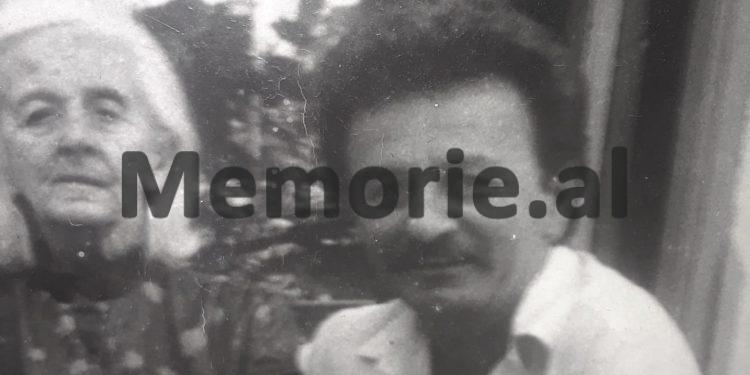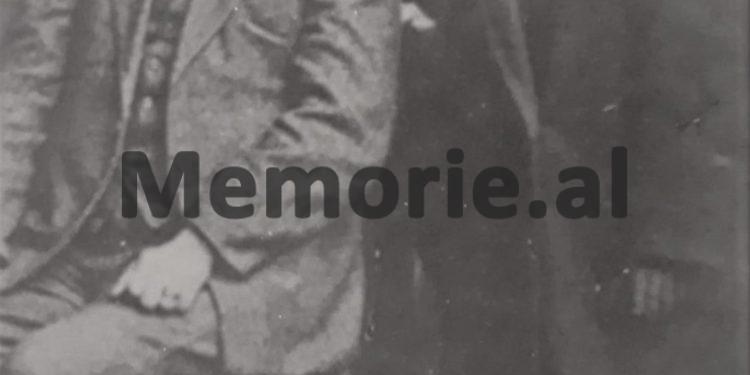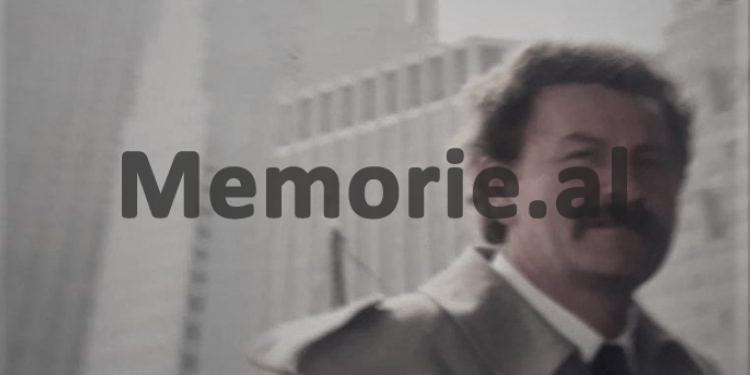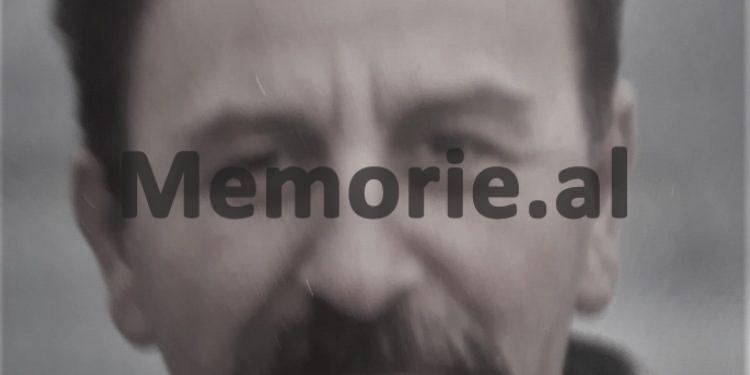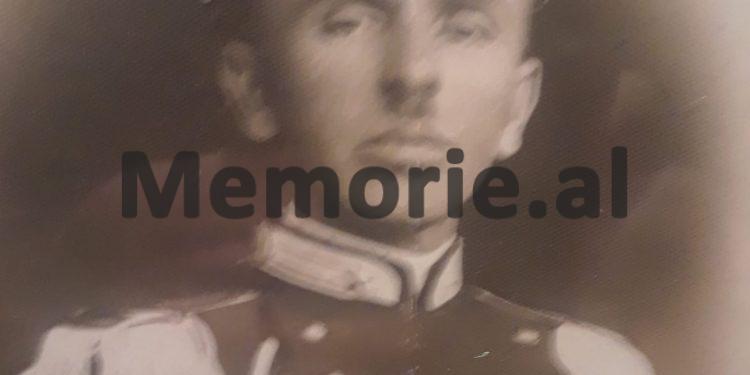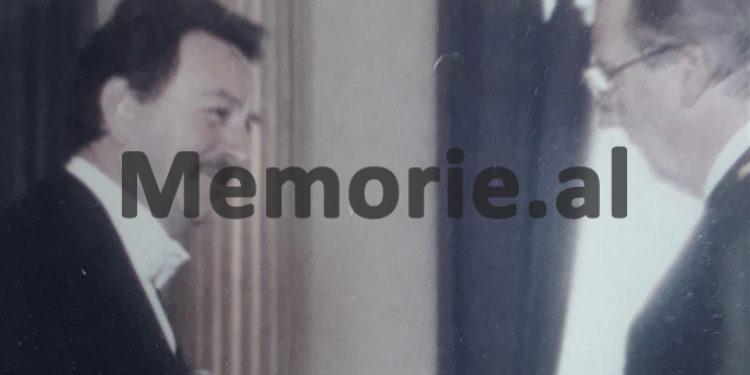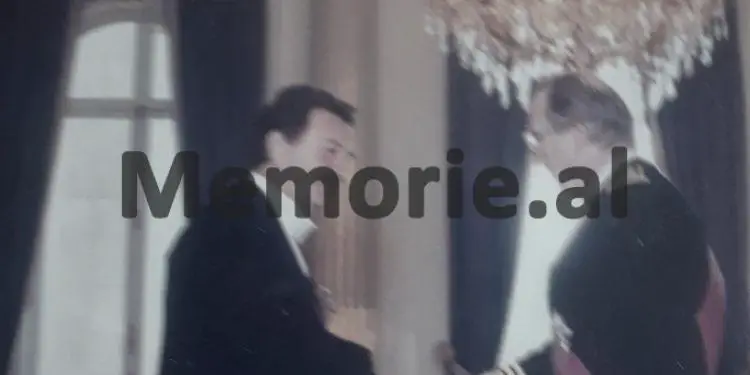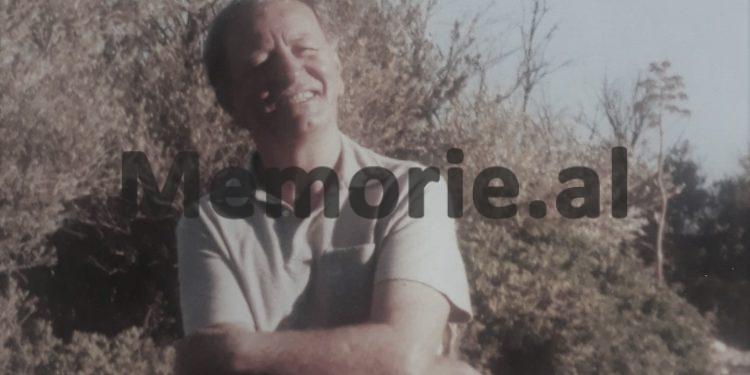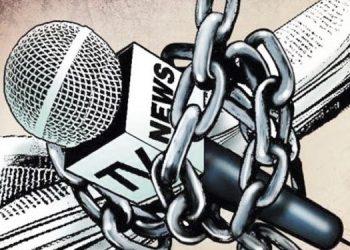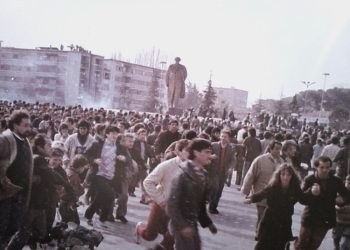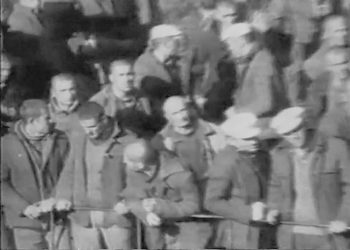By Bashkim Trenova
Memorie.al publishes the memoirs of the well-known journalist, publicist, translator, researcher, writer, playwright and diplomat, Bashkim Trenova, who after graduating from the Faculty of History and Philology of the State University of Tirana, in 1966 was appointed a journalist at Radio- Tirana in its Foreign Directorate, where he worked until 1975, when he was appointed as a journalist and head of the foreign editorial office of the newspaper ‘Zeri i Popullit’, a body of the Central Committee of the ALP. In the years 1984-1990, he served as chairman of the Publishing Branch in the General Directorate of State Archives and after the first free elections in Albania, in March 1991, he was appointed to the newspaper ‘Rilindja Demokratike’, initially as deputy / editor-in-chief and then its editor-in-chief, until 1994, when he was appointed to the Ministry of Foreign Affairs. with the position of Press Director and spokesperson of that ministry. In 1997, Trenova was appointed Ambassador of Albania to the Kingdom of Belgium and to the Grand Duchy of Luxembourg. Unknown memories of Mr. Trenova, starting from the war period, his childhood, college years, professional career as a journalist and researcher at Radio Tirana, the newspaper ‘People’s Voice’ and the Central State Archive, where he served until the fall of the communist regime of Enver Hoxha, a period of time when he in different circumstances became acquainted with some of the ‘reactionary families’ and their sucklings, whom he described with a rare skill in a book of memoirs published in 2012, entitled’ Enemies of the people ‘and now brings them to the readers of Memorie.al
Continued from the previous issue
“Enemies of the people”
Debates with the school principal and the literature professor, who found “ideological errors” in my draft
With Sofokli Afezolli, I would have other confrontations. One happened in 1959. I was a sophomore in my sophomore year. There was a lot of talk about the new paths to socialism, propagated by Khrushchev, the leader of the Communist Party of the Soviet Union, so to speak, the ‘Pope of Communism’. Our very enthusiastic principal comes to our class to talk to us about the “peaceful way to socialism.” After he finished the lecture, he asked that we, his students, speak as well. I stood up and said that: the transition to socialism in a peaceful way was not possible, that revolution was the only way to a transition to socialism. I also used the Spanish War in 1936-1939 as an argument in my favor. We debated until the end of the lesson, each remaining in his own opinion. I knew that our director had a stain with the Tirana Party Conference. Opposing it I thought I was defending revolution, socialism, and communism.
In the same year, in a literature class, our professor, Bestar Kongoli, asked us to make a draft by choosing his own topic. I wrote about the national discrimination against the Albanian school in Kosovo, then part of Yugoslavia, the province of Serbia. After the correction he made to our drafts, Professor Kongoli, had evaluated my draft with a grade of two plus. Grade two was the lowest, impassable. On the side of the notebook page, he wrote: “Great ideological errors, chauvinistic thoughts.” He also showed the design to the class. I, severely offended, went to the director. I told him what I had treated him and asked him if he thought she was a “chauvinist”? He asked me to leave his notebook and go to the Director the next day to meet him. So I did. Sofokli Afezolli told me that the draft had no chauvinistic thoughts at all, that the school so loved its students. It was the first and last time we were of one mind. Bestar Kongoli changed the grade of my design from two plus, to three plus. The trio was the threshold of the passing grade. I have not seen Bestar Kongoli since. In teaching literature, he was replaced by Fejzi Dika.
Fejzi Dika, a graduate professor in France, who told me the first ‘poems’
Fejzi Dika, a noble man, calm, romantic, a little gray, had published a volume of poetry before the War. He had studied in France, where he was acquainted with what would become the leader of the Communist Party of Albania, Enver Hoxha. After the War, on him, as on almost all Albanian students who had known Enver Hoxha in Paris, the ‘lightning’ of Zeus had fallen. The well-known writer, Ismail Kadare, speaking about those whom he has described as “masters of Albanian culture”, mentions among them Fejzi Dika. Ismail Kadare says: “The communist regime immediately felt that this team of writers, these last Mohicans, was foreign to him.”They were annoying witnesses to his crimes.”
Fejzi Dika I told my first “poems”. As a student, I had then received the first and last trophy in the field of literature. In honor of the III Congress of the Labor Party, I was decorated with the “medal” of the “New Literature”. This “medal”, which I still have today stored in a special box lined with blue velvet, is a round plate, baked clay. At its center is the figure of a pioneer who honors with his hand raised high above his head. On the side are written the words: “New literature. In honor of the III Congress of the ALP”. At the top of it, there is a space where a blue silk ribbon passes in the form of a ribbon. From Professor Fejzi Dika, I also received the first, careful advice in the field of what is called literary creativity, where almost everyone starts in their youth, but that very, very few reach the finish.
Professor Fejzi Dika was with a very complete culture. He, together with Natali Markun, the Russian pedagogue about whom I will write in another chapter, where I will also talk about her husband, General Gjin Markun, were the last high school professors stigmatized by the regime with a “stain on the biography” ”. Natalia, in fact, at the time when she was a Russian teacher at the ‘Red School’, was not “stained in the biography”. She would become one, even quite suddenly.
Transfer to Durrës of the director, Afezolli, after the debates about Marx and Lenin!
In 1960, the last year of high school, something similar to what I explained about the second year of high school was repeated. Soviet and Albanian communists had declared their deep ideo-political divergences. On the “battlefield”, quotes from Marx and Lenin were encountered. The director, who taught us History, spoke to us for two hours about these divergences, adding that the Soviet communists were our comrades, that they had made mistakes, but remained our comrades. In the end I stood up and spoke, expressing the opinion that the Soviet communists were not “comrades who had made a mistake,” but traitors to Marxism-Leninism, that Khrushchev, their leader, was an intriguer, and so on and so forth. We parted like this and everything would have ended like this, if our principal, Sofokli Afezolli, in the next lesson, did not reopen this topic in front of the class. He repeated, essentially, the same things insisting that I get up and speak again. I got up and spoke. I did not agree with him. I repeated, more or less, what I had said before.
In my view, our director had not only misconceptions but also misconceptions. Not only did he have these for himself, but he also sought to impose them on high school students with the authority of the principal. This, I, the worthy son of the Party, could not pass over in silence. I went immediately and met Meriban Hoxha, lecturer and secretary of the school Party organization. I told her everything. She went and talked to the director. When he returned, he told me I was right. Sofokli Afezolli was then expelled from the gymnasium. He was transferred to Durrës, where he worked until the end as Director of the Durrës Theater, a professional theater with very talented actors. I do not know if the reason for his departure from Tirana was my conversation with Meriban Hoxha.
In the characteristic of my high school diploma, it was written: to continue for diplomacy
When we finished the last Matura exams, as the last year of high school exams were called, for all students who would continue their studies, it became a feature where the school gave its opinion, in which faculty each one should continue his studies of us. In my character, it was suggested that I pursue diplomacy, political science. In my opinion, the characteristics were made by the Party secretary and the school principal. At the moment this feature did not serve me. I was assigned to study at the Agricultural University, for ‘Forest Engineering’. I did not go to this University. I missed a school year. During this year I worked as a teacher in a night school in Laknas, a village near Tirana. My students were either my age or older. At the end of the year I passed them all, even those who did not deserve it. This, of course, was not communist, but it was not a heresy either.
In fact, after the first heresy, that of the conversation with Dije and Skënder, for a better standard of living in Yugoslavia compared to that in Albania, I committed the second heresy in a conversation with my brother-in-law, Ibrahim Pajova. He, like Dija and Skënderi, had been a very young partisan. After the war, he graduated from two military academies in the Soviet Union. My brother-in-law worked in the Ministry of Defense. He was the Chief of Staff of the Military Brigade in Durrës and Commander of the Brigade in Lushnje. He closed his military career as a lecturer at the Military Academy in Tirana.
Debates with my brother-in-law, military, why I listened to Greek songs!
My relationship with my brother-in-law has never been cloudless. I had to constantly be careful not to threaten them badly, but I did not always succeed. It seems to me as if he had never swallowed the fact that I as a child had been against my sister’s engagement to him. The sister, the Angel, had said this to him with a laugh, but he seldom laughed. He was more willing to come into conflict for nothing. He was willing to get confused even though I was listening to Greek songs on the radio. “They are songs of a capitalist, bourgeois country,” he told me. He himself liked Old Italian songs, those of the pre-war and the years of Italian occupation. I knew this and to defend myself I opposed him, saying: “What about Italian songs, are not they also from those of a capitalist, bourgeois country”?! He continued like this until his old age, until he retired. The change, I believe, happened after the overthrow of communism, when he left Albania and settled in Italy, together with my sister. There they had their two daughters, Venus who was married to an Italian, Angelon, and Iris. Another girl, Alma, was in Greece.
In a conversation I had with him on one of my visits to Italy, he admitted that in Albania “change had to be made, but that we did not have a national bourgeoisie formed as a class that could make this change in a regular”. This statement was made, as I think, in a special moment of sincerity. However, he generally stayed to the end in the thoughts and attitudes with which he was formed. The difference was that before he always wanted something to quarrel with. Cases were not lacking, as if he felt them even when they were not found…!
The next incident with my brother-in-law, why was I against the flags of the Soviet Union!
One fine day, all of us as a family were having lunch under the shade of a vineyard tent in the backyard. I do not remember now why, after various conversations, the word passed to the Soviet Union. Maybe it served as a trigger any memory from Ibrahim’s student life in this country!? It was still the time of unbreakable Albanian-Soviet friendship. I, at one point expressed the opinion that the Soviet Union was our great and expensive ally, but there was no reason for Soviet flags, on holidays, to be placed everywhere next to the Albanian flag, that we are not a Soviet colony. I deserved the biggest insults that have been made to me in my whole life, such as: “beast”, “ass”. As if that wasn’t enough, my brother-in-law took a boiled egg from the table and squeezed it into my mouth to close it. My words were heresy.
The Soviet Union was the Jerusalem of international communism, its ‘Olympus’, therefore, untouchable, worshiped. However, it is also known that the gods, the saints also arouse fear. Ibrahim was and remained to the end a devout communist, to an absurd blindness. This did not prevent him, however, from seeing how prominent heads of martial arts, both in the Soviet Union and in Albania, had rolled to the ground, how the golden pallets of Albanian or Soviet generals had flown in the air with their heads. . Are you scared? In war my brother-in-law was brave and therefore decorated with the ‘Medal of Courage’ and other medals, but peace is often more dangerous than war. In peace, in fact, except for children, in Albania everyone was scared, did not feel safe.
Offer to work in the General Investigation and rejection by the Central Committee of my candidacy!
I noticed this hidden duality of personality in Ibrahim even years later. In the early ‘80s of the last century, Qemal Lame, at that time head of the General Investigation, proposed me to work in this Investigator as head of the scientific sector. Qemali knew me because we had Lulzim Hana as a mutual friend. The General Investigation, together with the State Security, was the most beloved weapons of the ‘Dictatorship of the Proletariat’. Through them, the red Zeus threw fire and lightning, sowed death and terror everywhere in Albania. I talked to my brother-in-law about this post being offered to me. Normally, as a hardened communist, he should have encouraged me, even congratulated me, and told me that I was being offered a good chance. That did not happen. He emphatically spoke out against it. “You do not need that place,” he told me! I did not ask why because there was no need. Kemal’s superiors in the Central Committee of the Party had not agreed with my candidacy. Thus ended this story.
Qemal Lame himself, years later, would leave Albania and seek political asylum in Germany. He knew a lot, so it was decided by those who had appointed him to that post, to be silent forever. They tried to eliminate him. They plotted a “banal” accident on the road, but he miraculously escaped. Before leaving Albania, he came to the editorial office of the newspaper “Rilindja Demokratike” and asked me to publish an article, where he explained his position. While the communist dome still in power urged him to remain silent, the Democrats, still briefly in opposition, demanded that he testify to the truths hidden by the institution he headed. I published Qemal Lame’s article and, since then, I have never met him again. The case brought him years later, to meet his brother, Enver Lamen. He gave me two books authored by Qemali.
The fate of Qemali, which could have been my fate, reminds me of an article by Bedri Spahiu published on June 6, 1991, in the newspaper “Republika”. First I want to remind you that Bedri Spahiu is known, among others, as a prosecutor of the Special Court that took place on March 14, 1945 and based on which 60 people were sentenced, 17 to be shot, among them Bahri Omari , brother-in-law of the dictator. Others were sentenced to severe imprisonment. Many of them died in prisons. The irony is that the Special Court Prosecutor, Bedri Spahiu, would himself be sentenced to imprisonment by the same mechanism a few years later and would serve his sentence for several decades until communism was overthrown. It is not excluded that he happened to be in the same prison or even in the same cell with his victims.
In the article published in “Republika”, Bedri Spahiu will say: “Today I feel ashamed that I was in the role of Prosecutor of that trial”. I would probably feel ashamed if I had worked in the General Investigation, although it must be said that not all those who worked there, as well as not all those who served in the State Security, were criminals, or had stained hands with the blood of innocent victims of communism.
My graduation in the Department of History-Geography, Faculty of History-Philology
During the years 1962-1966, I continued my higher studies at the State University of Tirana, in the Department of History-Geography of the Faculty of History-Philology. The Rector of the University, the deans of the departments, the professors who taught us at the Faculty, was certainly elected. They were either communists or former partisans, or came from loyal families of the regime. It cannot be said, however, that in the Rectorates and in the various Faculties, there were no persons “stained in the biography”.
Me and my classmates, he gave us lectures from “History of Albania”, Professor Kristo Frashëri. I remember him for his strong personality. Kristo Frashëri, when he assessed something as a right that should be defended, did not ask about the circumstances or the consequences, he threw himself with all his being and anger into action. This is what he did in his first meeting with what would become the dictator of the country, Enver Hoxha, after the war.
As Professor Frashëri himself showed in an interview given in January 2010 on the TV show “Opinion” “Klan”, initially he had a positive feeling towards Enver Hoxha. This did not last long. In the First Asset of the communist leaders of the capital in 1942, Enver Hoxha spoke about democratic centralism or, in other words, how the Albanian Communist Party saw democracy in its bosom. Kristo Frashëri did not accept this kind of democracy. He was expelled from the Party and would never be accepted as a member of the Communist Party of Albania. The command of the partisan unit, where Kristo Frashëri was part of, was given a written order to be monitored and, in case of suspicion, to get rid of the bullet in the head. This means that during the War he risked losing his life at the same time as a martyr or, similarly, as a traitor. His life was endangered equally by the bullets of the invaders as well as by those of the anti-fascist comrades with whom he was in a trench. Memorie.al
The next issue follows




